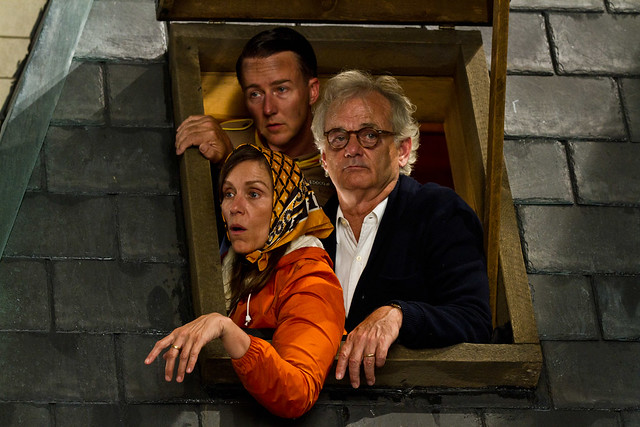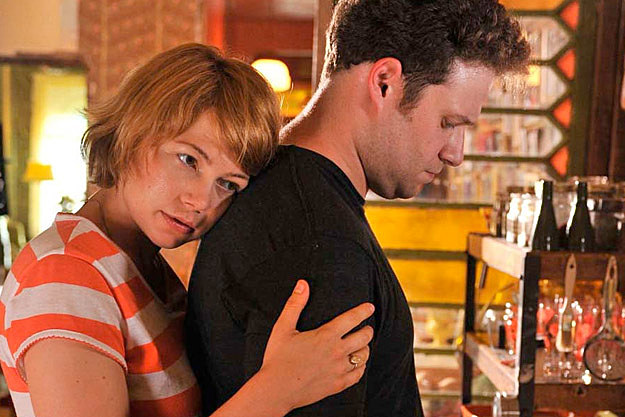A little something I wrote for The Philly Post on why straight men need to get over their apprehension and enjoy Magic Mike.
Guys, honestly, there's a lot here to like--and I don't just mean Olivia Munn's topless scene.
Friday, July 27, 2012
Thursday, July 12, 2012
On "Take This Waltz," Michelle Williams, and Her Heirs
I think we'll look back in 20 years and say, "Man, the twenty-tens was a golden age for young actresses." My latest for The Philly Post.
Tuesday, July 10, 2012
Review: "The Amazing Spider-Man"
Insert variation of "my Spidey senses aren't tingling" in the comments section. You can read my review for "The Weekender"--devoid of puns--here.
Friday, July 6, 2012
Book of the Month: July 2012
I love books. They're fun, educational, and they give thrift stores a touch of class.
It's come to my attention that I haven't posted a book of the month in forever. There are several reasons for this: A lack of time. Professional obligations. And the addition of roughly 800 channels to our cable package, which means that I'm watching the NFL Network's "Top 10" at a damaging rate.
So as a short cut, here's a list of the five best books I've read this half-year: either as a grubby professional or in my free time. These are in no particular order.
1.) Father's Day by Buzz Bissinger. For those who only know Bissinger as Twitter's resident crank, oh are you missing out. A heartbreaking, poignant memoir about the relationship with his son, Zach, who has trace brain damage. The most honest book about fathers and sons I've ever read--and one of the best.
2.) This Love is Not for Cowards by Robert Andrew Powell. I compared Powell's work to Susan Orlean's in my review for BookPage. I assure you that it was not hyperbole.
3.) Dream Team by Jack McCallum. The best basketball writer of my generation covers the best team of my generation.
4.) The Fish That Ate the Whale by Rich Cohen. You'll gain a new respect for good, old-fashioned business hustle. "You're fucking fired! Do you understand that?"
5.) The One: The Life and Music of James Brown by R.J. Smith. It's about James Brown, one of my all-time favorites, but Smith breaks down what made the man so special ("Teeth and hair!"). And he details his love of smack and asses.
Oh, and because this is a movie blog, a quickie halftime report of the best and worst cinematically.
BEST: Moonrise Kingdom, Monsieur Lazhar, Take This Waltz, Salmon Fishing in the Yemen, Jeff, Who Lives at Home, 21 Jump Street, The Avengers, The Hunger Games, The Raid: Redemption, Magic Mike, Jiro Dreams of Sushi
WORST: American Reunion, Rock of Ages, The Lucky One, What to Expect When You're Expecting, The Magic of Belle Isle, John Carter, Meeting Evil
Until later, read in peace.
It's come to my attention that I haven't posted a book of the month in forever. There are several reasons for this: A lack of time. Professional obligations. And the addition of roughly 800 channels to our cable package, which means that I'm watching the NFL Network's "Top 10" at a damaging rate.
So as a short cut, here's a list of the five best books I've read this half-year: either as a grubby professional or in my free time. These are in no particular order.
1.) Father's Day by Buzz Bissinger. For those who only know Bissinger as Twitter's resident crank, oh are you missing out. A heartbreaking, poignant memoir about the relationship with his son, Zach, who has trace brain damage. The most honest book about fathers and sons I've ever read--and one of the best.
2.) This Love is Not for Cowards by Robert Andrew Powell. I compared Powell's work to Susan Orlean's in my review for BookPage. I assure you that it was not hyperbole.
3.) Dream Team by Jack McCallum. The best basketball writer of my generation covers the best team of my generation.
4.) The Fish That Ate the Whale by Rich Cohen. You'll gain a new respect for good, old-fashioned business hustle. "You're fucking fired! Do you understand that?"
5.) The One: The Life and Music of James Brown by R.J. Smith. It's about James Brown, one of my all-time favorites, but Smith breaks down what made the man so special ("Teeth and hair!"). And he details his love of smack and asses.
Oh, and because this is a movie blog, a quickie halftime report of the best and worst cinematically.
BEST: Moonrise Kingdom, Monsieur Lazhar, Take This Waltz, Salmon Fishing in the Yemen, Jeff, Who Lives at Home, 21 Jump Street, The Avengers, The Hunger Games, The Raid: Redemption, Magic Mike, Jiro Dreams of Sushi
WORST: American Reunion, Rock of Ages, The Lucky One, What to Expect When You're Expecting, The Magic of Belle Isle, John Carter, Meeting Evil
Until later, read in peace.
Tuesday, July 3, 2012
Review of "Ted"
After its $54.1 million opening weekend I'm certain Universal will be clamoring for a sequel. Everyone involved should say no. This has "too much of a good thing" written all over it.
I explain why in my review for The Weekender, which you can read here.
Film Round-Up, July 2012: Paul Williams: Still Alive, The Magic of Belle Isle, Your Sister's Sister, Moonrise Kingdom
In this edition of the Film Round-Up, three movies that do not suck. And one directed by Rob Reiner. These reviews previously appeared in ICON and are reprinted with permission.
Paul Williams: Still Alive (Dir: Stephen Kessler).
Growing up in the 1970s, Kessler felt a kinship with songwriter Williams
("Evergreen," "The Rainbow Connection"), who appeared in
dozens of TV shows and movies. Decades later, Kessler discovered that Williams
was alive and sought to reconnect "with my friend from the
television." Kessler soon follows Williams everywhere—a show in Las Vegas,
a quickie tour through the Philippines—growing from sketchy fan to camera-carrying
nuisance to friend. Some may find Kessler's on-camera presence and incessant
narration gimmicky, but he cuts through the celebrity gloss and 70s kitsch,
capturing the real person. The depth of this good-natured documentary surprises
you. Williams suffered from alcohol and drug problems, but his quest for fame
may have been his ultimate undoing. "I felt like I belonged in the
world," says Williams, who appeared in everything from The Tonight Show
(50 times) to Circus of the Stars. That Williams now happily plays
small venues and lives in a modest California home defines the film's poignant
sweetness. Finally, in his early seventies, he has found peace. "The last
couple of years have fucked up your movie," Williams says. "And I
love that." Me too. [PG-13] ****
The Magic of Belle Isle (Dir: Rob Reiner). Starring:
Morgan Freeman, Virginia Madsen, Emma Fuhrmann, Fred Willard, Kenan Thompson,
Kevin Pollak, Ash Christian. Widowed and paralyzed, irritable and self-pitying,
creatively dormant novelist Monte Wildhorn (Freeman) spends his days filling
the holes in his life with booze. His concerned nephew (Thompson) finds Monte a
summer home in a charming lakeside town, where Monte continues his
self-destructive ways until he meets his neighbor (Madsen), an attractive,
intelligent single mother with three young girls. Monte bonds with the middle
child, a precocious tomboy (Fuhrmann) who wants to know "where stories
come from." Pretty soon Monte is on a path toward redemption. The sheer
volume of supporting characters and storylines keep Freeman, Madsen, and
Fuhrmann's characters—easily the best in the ensemble—from evolving beyond
neon-lit signs of redemption or innocence. Maybe if the screenplay, co-written
by Reiner, weren't so concerned with showcasing Freeman's godly,
integrity-infused pipes (e.g., teaching a dog to play catch, confronting an
obnoxious birthday party clown), The Magic of Belle Isle wouldn't feel
so shallow. Also available on demand. [PG] **
Your Sister's Sister (Dir: Lynn Shelton). Starring:
Emily Blunt, Mark Duplass, Rosemarie DeWitt. A year after his brother's desk,
Jack (Duplass) is rudderless to the point of self-destruction. Jack's concerned
friend, Iris (Blunt), also his brother's ex, offers the use of her father's
secluded cabin so he can "stare at the water and think about your
life." When he finally arrives, Iris's lesbian sister, Hannah (DeWitt), is
already there, recovering from a break-up with her longtime partner. A late
night drinking session later, Jack and Hannah sleep together. That boozy
hook-up turns into a life-altering event when Iris arrives unannounced, leading
to a series of revelations among the houseguests. Like her terrific previous
effort, Humpday, Shelton takes an outlandish premise and uses it to
showcase the emotional fragility of adults in transition. There's nothing
forced or phony in this tale of people forced to find themselves during a brief
period of tumult. Terrific performances by everyone, especially DeWitt (Rachel
Getting Married) as the simultaneously assured and panicked Hannah and
Duplass (starting to rival Mark Ruffalo in the aw-shucks charm department) as
the man-child forced to become an adult. Heavily improvised, making the
assuredness of the final product all the more remarkable. [R] ***1/2
Moonrise Kingdom (Dir: Wes Anderson). Starring: Jared
Gilman, Kara Hayward, Bruce Willis, Edward Norton, Frances McDormand, Bill
Murray, Tilda Swinton, Jason Schwartzman, Bob Balaban, Harvey Keitel.
Gorgeously presented, sweetly told story takes place in a fictitious New
England island during the summer of 1965. Perpetual orphan and unpopular Khaki
Scout Sam Shakusky (Gilman) escapes camp to marry pen pal and bookish
troublemaker Suzy Bishop (Hayward). The kids' innocent elopement soon takes on
epic proportions, raising the concern of her parents (McDormand and Murray),
Sam's earnest Scout Master (Norton), and the island's patient police chief
(Willis). Works beautifully as an adolescent adventure—Gilman and Hayward stand
out among the accomplished, star-studded ensemble—but adults will savor how
Anderson and co-writer Roman Coppola frame the story as an ode to the
bewilderment of our pre- early teenage years: how the adult world reveals
itself in bits and pieces, how everything is imbued with consequence now that
we're older. Anderson's recent efforts have felt more like an
accumulation of lushly colored, quirky details than complete films. In Moonrise
Kingdom, those artistic tendencies provide a sweeping storybook quality to
a timeless film about the raw, open-ended adventure that is childhood. [PG-13]
****1/2
The Big Review: "Take This Waltz"
At this point, I'd pay to watch Michelle Williams pay her bills. One of my favorite movies this year. This review previously appeared in ICON and is reprinted with permission. (Thanks, Trina.)
In the opening minutes of Take This Waltz, the movie's young protagonist comments that she doesn’t like "being in between things." Mmm. Even when life is good, it's a long, hard slog toward happily ever after. Director-writer Sarah Polley's condescension-free drama presents a stirring, searing portrait of a woman destined for disappointment.
In the opening minutes of Take This Waltz, the movie's young protagonist comments that she doesn’t like "being in between things." Mmm. Even when life is good, it's a long, hard slog toward happily ever after. Director-writer Sarah Polley's condescension-free drama presents a stirring, searing portrait of a woman destined for disappointment.
Margot (Michelle Williams) is married to Lou (Seth Rogen), a
likable cookbook writer whose specialty is chicken dishes. The couple lives in
a charming house in a trendy, colorful Toronto neighborhood. They seem happy
together, though after five years of marriage complacency has set in: eating in
front of the TV, going to the bathroom together. In short, they're like
everybody else.
After a business trip, Margot isn't so sure. She ran into a
handsome, confident stranger (Luke Kirby) whom she ended up sitting next to on
the plane ride home. The shameless flirting continued when they shared a cab.
Before exiting, she put an end to the fantasy sabbatical. "I'm
married," she says. "It's too bad," Daniel responds,
"because I live here."
A week ago, Margot didn't know Daniel, an artist and
rickshaw operator, existed. Now, he's everywhere. She gets up early to go food
shopping and runs into him getting ready for work. He invites her to his place
for coffee. "You seem restless, not now but in a kind of permanent
way," he says. She talks of being suddenly sad when she submits to
the beauty of the everyday. Daniel suggests that those feelings come from
something less abstract. His directness is a warning to Margot—stay away—that
she misses. Perhaps she only sees positive messages in allegories. In any case,
she becomes hopelessly enamored with Daniel.
Thanks to Polley's confidence with the material, Margot
isn't a dope or a victim. She's just hopelessly naïve. When she snuggles
against Lou while he's cooking, she takes his rebuke seriously, not thinking
that he might be too busy. Lou, moody and gruff, could be more affectionate,
but he's a good man. He would come around sooner if Margot took initiative,
which explains her infatuation with Daniel. He's always there. He shows
up at a ridiculous aqua aerobics class, where a laughing jag causes Margot to
pee in the pool. He talks dirty to her when they meet for martinis
afterward. But she must commit to leaving Lou. She can't imagine eliminating
her possibilities; the concept of could-have-been paralyzes her. The grass is
greener everywhere. "It's [time] for you to do something,"
Daniel tells her, "not me." Believe it or not, Daniel is the movie's
voice of reason, and his intentions with Margot aren't exactly noble.
Margot is not a particularly likable character, but Williams
makes us care about her. The actress can worm inside the skin of sad souls (Blue
Valentine, My Week with Marilyn) and bring out their despair with
painful, poignant subtlety. Her work in Take This Waltz pads the resume.
No one creates more impact with less histrionics than Williams; her use of
expressions to convey everyday despair always amazes me. Rogen dampens his
sarcasm to deliver a sympathetic performance that doesn’t wilt against
Williams's ill-advised yearning. Kirby manages to be predator-like and
dignified in his courtship. The biggest surprise here is Sarah Silverman. The
comedian uses her bite to compelling effect as Margot's sister-in-law, who is a
clear-eyed realist even when she's drunk.
Polley doesn't fashion an I-told-you-so retort to every Kate
Hudson movie as much as show that marriage is not a lifelong stretch of bliss.
Sometimes it's boring. Sometimes it's fun. Occasionally there will be an
argument…or no dialogue whatsoever. A handsome, artsy neighbor whom you see
everywhere and a few sexless nights don't necessitate wholesale change. Movies
frequently advise that breaking free from a cycle of blandness will lead to
unimagined happiness. According to Polley (Away from Her), it's not that
simple. It's easier, perfectly OK even, to revel in possibilities. Polley, in
fact, presents Margot with multiple opportunities to opt for the lovely realm
of what-if. It's a sign of how good Take This Waltz is that we pray
Margot sees what Polley does—that all couples, regardless of how intoxicating
their initial attraction, are together in the same way. [R]
Subscribe to:
Comments (Atom)






